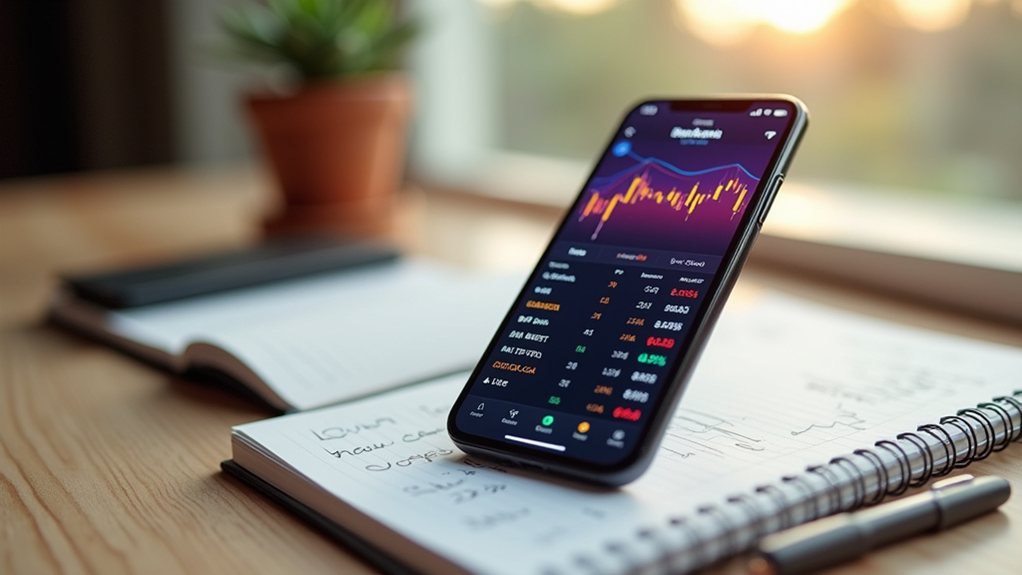BTC primarily stands for Bitcoin, the first cryptocurrency created in 2009 by Satoshi Nakamoto. Running on blockchain technology, it's recognized worldwide as a decentralized digital currency with a fixed supply of 21 million coins. In financial markets, BTC serves as Bitcoin's ticker symbol on exchanges. Notably, BTC can also mean Business-to-Consumer in marketing contexts. The acronym carries different meanings depending on who's talking about it.

The acronym BTC is most widely recognized as Bitcoin, the pioneering cryptocurrency that revolutionized digital finance. Created in 2009 by the mysterious Satoshi Nakamoto—whoever that is—Bitcoin introduced the world to blockchain technology and decentralized currency. It's digital money. No banks. No governments. Just code and consensus. Bitcoin has a fixed supply of 21 million coins, making it inherently deflationary. Once they're gone, that's it. No printing more like traditional currencies.
Bitcoin: digital revolution, mysterious origins, finite supply. Code that redefined money without banks or governments.
In financial circles, BTC serves as the ticker symbol for Bitcoin on cryptocurrency exchanges worldwide. Just like how AAPL represents Apple or TSLA stands for Tesla, BTC is how traders and investors identify Bitcoin in market contexts. Bitcoin operates on a peer-to-peer system that eliminates the need for financial intermediaries. You'll see it paired with fiat currencies (BTC/USD, BTC/EUR) on trading platforms, financial news, and investment portfolios. It's the universal shorthand for Bitcoin's price and market movements.
The technology sector uses BTC when discussing Bitcoin's underlying protocol and infrastructure. Developers regularly reference BTC in technical documentation and code. Bitcoin Core, the primary software implementation of the Bitcoin protocol, sometimes gets abbreviated as BTC as well. The acronym appears frequently in technical discussions about blockchain architecture, mining algorithms, and cryptographic principles. Unlike physical currency, BTC exists solely as unique code strings recorded on the blockchain.
But here's where it gets interesting. BTC isn't just about cryptocurrency. In business contexts, particularly marketing and e-commerce, BTC stands for Business-to-Consumer. This describes companies that sell products or services directly to end users—think Amazon or Netflix. It's distinct from B2B (Business-to-Business) models. Marketing strategists throw around "BTC" in meetings about consumer-facing initiatives all the time. The abbreviation is commonly pronounced as /ˌbiː tə ˈsiː/ in professional settings.
Healthcare professionals use BTC too, but for something completely different. Behind the Counter medications require pharmacist intervention but not a prescription. They're neither prescription drugs nor freely available over-the-counter medicines. BTC meds occupy that middle ground.
The acronym pops up in bizarre places. New Yorkers might use BTC as shorthand for "Bridge and Tunnel Crowd," referring to commuters from outside Manhattan. Document handlers might scribble "BTC" meaning "Burn This Copy" on sensitive papers. Some casual texters use it for "Be There or Be Square." Gamers know it as "Biting The Carpet." It's even Bhutan's country code in certain international standards.
BTC exemplifies how language evolves in our acronym-obsessed world. One three-letter combo, countless meanings. But let's be real—when someone mentions BTC today, they're probably talking about Bitcoin. That's the definition that's changed the world economy. The others? Just footnotes in the grand story of this influential acronym.
Frequently Asked Questions
How Much Is One BTC Worth Today?
Bitcoin (BTC) is currently worth $82,930 as of March 14, 2025.
The price has been volatile lately. It's down slightly in the last 24 hours, but up nearly 13% over the past week. Pretty impressive.
BTC has been bouncing between approximately $80K and $84K in recent trading. Just last year, it hit what was then an all-time high of $69,000. That record's been shattered now.
Who Created Bitcoin?
Bitcoin was created by Satoshi Nakamoto, a pseudonymous figure whose real identity remains unknown.
Nakamoto published the Bitcoin whitepaper in 2008 and mined the genesis block on January 3, 2009.
They disappeared from public involvement in late 2010, leaving behind an estimated 700,000-1,000,000 bitcoins.
Despite numerous claims and speculation around figures like Craig Wright and Nick Szabo, nobody has definitively proven themselves to be Nakamoto.
How Can I Safely Store My Bitcoin?
Storing Bitcoin safely requires multiple options.
Hardware wallets like Ledger and Trezor provide maximum security by keeping private keys offline. No internet, no hacking. Period.
Software wallets offer convenience but come with online risks. Some folks still use paper wallets—literally printing keys on paper.
Smart Bitcoin holders? They combine approaches. Cold storage for savings, hot wallets for everyday use.
Backup those recovery phrases. Lose them, lose everything.
Is Bitcoin Legal in All Countries?
Bitcoin isn't legal everywhere. Nope. It's legal in 119 countries but completely banned in 22, including China and Morocco.
Weird mix elsewhere—25 countries have no official position, while 62 regulate it to varying degrees.
Only El Salvador uses it as actual legal tender. Most nations are scrambling to figure out how to handle it.
Regulatory approaches? All over the map. Literally.
What Determines Bitcoin's Market Price?
Bitcoin's price is a complex dance of supply and demand. Limited to 21 million coins, with halvings reducing new supply every four years.
Market sentiment swings wildly with media coverage and regulatory news. Institutional money moves mountains.
Macroeconomic factors matter too—inflation, currency devaluations, geopolitical chaos.
Competition from other cryptos keeps things interesting. Network growth signals adoption.
No single factor rules them all. The market decides, for better or worse.








